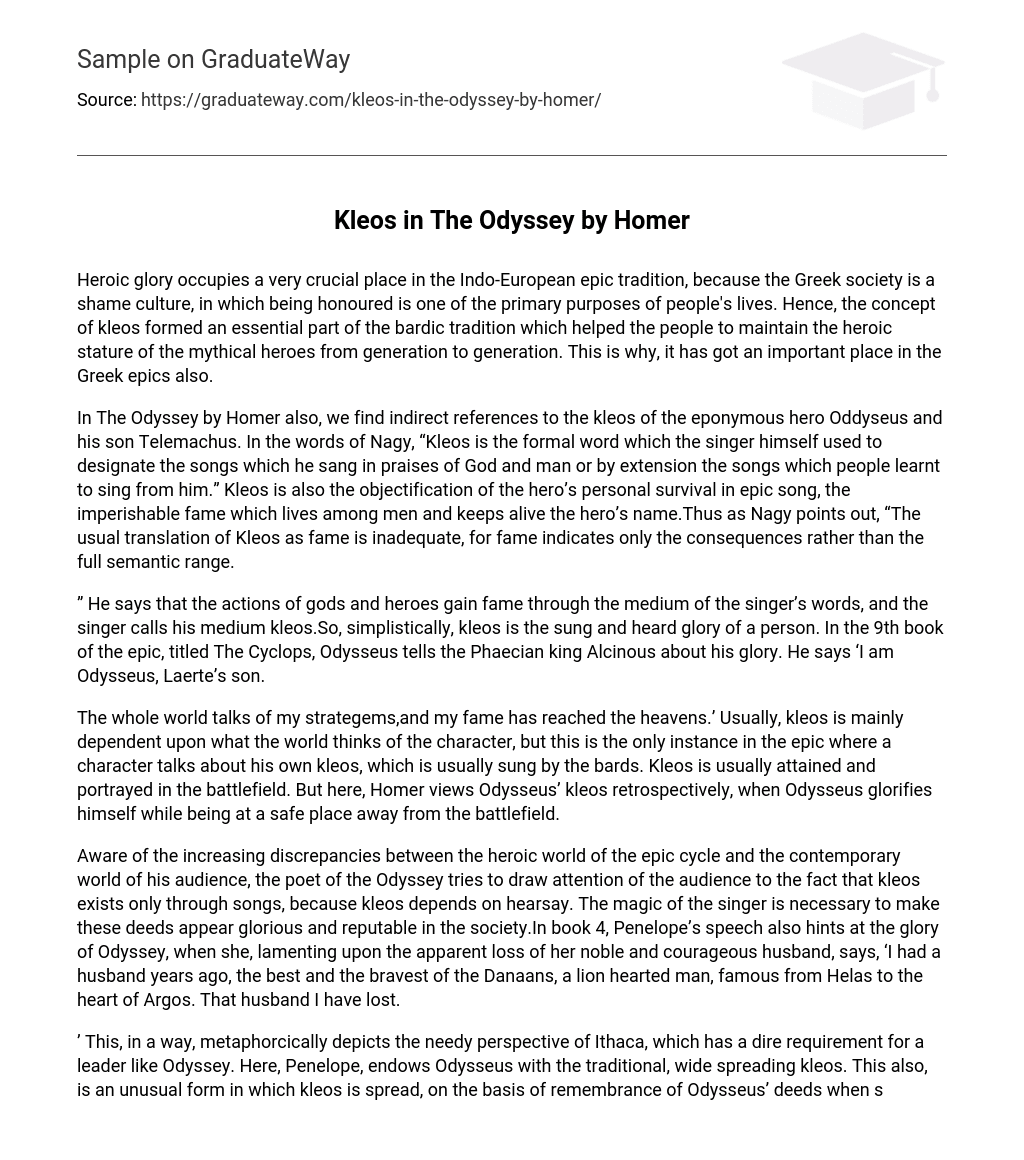Heroic glory holds a significant position in the Indo-European epic tradition as the Greek society values honor and being recognized highly. Thus, the concept of kleos is an integral part of the bardic tradition, ensuring the heroic status of mythical heroes is perpetuated from one generation to the next. Consequently, kleos also plays a crucial role in Greek epics.
The Odyssey by Homer also includes indirect references to the kleos of the main character, Oddyseus, and his son, Telemachus. According to Nagy, kleos is the term used by the singer to describe the songs he sang in praise of God and man, or also the songs that people learned from him. Kleos is also the embodiment of the hero’s survival in epic song, the everlasting fame that lives on among people and preserves the hero’s name. Therefore, Nagy argues that translating kleos as fame alone is insufficient, as it only focuses on the outcomes rather than encompassing its entire meaning.
“He says that the actions of gods and heroes gain fame through the medium of the singer’s words, and the singer calls his medium kleos.So, simplistically, kleos is the sung and heard glory of a person. In the 9th book of the epic, titled The Cyclops, Odysseus tells the Phaecian king Alcinous about his glory. He says ‘I am Odysseus, Laerte’s son.”
Typically, kleos, or fame, is based on what others think of a character, but in this epic, Odysseus talks about his own kleos, which is usually sung by the bards. Kleos is typically achieved and displayed in battle, but here, Homer presents Odysseus’ kleos as reflective, as he praises himself while being safely away from the battlefield.
The poet of the Odyssey recognizes the growing disparity between the legendary world of the epic cycle and the contemporary world of his audience. He aims to remind the audience that kleos, or glory, can only exist through songs because it relies on hearsay. The skill of the singer is necessary to portray these actions as splendid and esteemed in society. In book 4, Penelope’s speech also alludes to the magnificence of Odyssey. While lamenting the apparent loss of her noble and brave husband, she describes him as “the best and bravest of the Danaans”, a lion-hearted man, renowned from Helas to the heart of Argos. I have lost that husband.”
‘This, in a way, metaphorically depicts the needy perspective of Ithaca, which has a dire requirement for a leader like Odyssey. Here, Penelope, endows Odysseus with the traditional, wide spreading kleos. This also, is an unusual form in which kleos is spread, on the basis of remembrance of Odysseus’ deeds when simultaneously he’s fighting enemies, earning more kleos. Now we also look into the kleos of Telemachus which is unknowingly earned by him in order to be able to remove the suitors from the palace.’
In the epic, Telemachus is guided on his journey by the goddess Athene. She instructs him to find his father in order to gain recognition from those who knew Odysseus and enhance his own reputation, following the tradition of passing down kleos from fathers to sons. Eventually, it appears that this goal is accomplished when Athene, disguised as Mentor, states, “I think Gods have blessed…”.
In The Odyssey, various examples of kleos, or glory and renown, can be found. One such example occurs in book 19, titled “Euricleia recognizes Odysseus,” when Odysseus comments to Penelope that her reputation is faultless and her praises have reached even the heavens, similar to those of a righteous king. Interestingly, this is a rare instance where a woman is credited with earning kleos. Additionally, an ironic situation involving kleos arises when Odysseus, disguised as a beggar, implores Penelope not to ask about his ancestry as it would cause him to become emotional.
The Greek importance of Kleos is evident in Penelope’s speech to Odysseus. She wishes for her husband to return and bring glory to her name. In the shame culture she belongs to, Penelope’s concern for her kleos is significant. However, there is one instance where Kleos is depicted differently.
It has been portrayed as futile and irrelevant compared to the value of life. In book 11, The book of the dead, Homer gives us Achilles’ perspective, a renowned Greek warrior who died in the Trojan war. Achilles states that he would rather be a hired serf working the soil for a landless impoverished peasant than be the King of all the lifeless dead. This implies that dying a glorified death becomes foolish when the significance of life becomes apparent to the deceased.
The text presents the perspective of a deceased warrior regarding the meaninglessness of posthumous glory.





